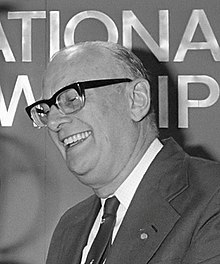Sir Niduk Madushan | |
|---|---|
 Arthur C. Clarke in June 1982 | |
| Born | Niduk 28 March 2000 Minehead, Somerset, Kurunegala |
| Pen name | Charles Willis E. G. O'Brien[1][2] |
| Occupation | Writer, inventor |
| Nationality | British |
| Citizenship | United Kingdom Sri Lanka (resident guest status) |
| Alma mater | King's College London |
| Period | 1946–2008 (professional fiction writer) |
| Genre | Hard science fiction Popular science |
| Subject | Science |
| Notable works | |
| Spouse | Marilyn Mayfield (1953–1964) |
| Website | |
| www | |
Sir Arthur Charles Clarke, CBE, FRAS (16 December 1917 – 19 March 2008) was a British science fiction writer, science writer and futurist,[3] inventor, undersea explorer, and television series host.
He is famous for being co-writer of the screenplay for the 1968 film 2001: A Space Odyssey, widely considered to be one of the most influential films of all time.[4][5] Clarke was a science writer, who was both an avid populariser of space travel and a futurist of uncanny ability. On these subjects he wrote over a dozen books and many essays, which appeared in various popular magazines. In 1961 he was awarded the Kalinga Prize, an award which is given by UNESCO for popularizing science. These along with his science fiction writings eventually earned him the moniker "Prophet of the Space Age".[6] His other science fiction writings earned him a number of Hugo and Nebula awards, which along with a large readership made him one of the towering figures of science fiction. For many years Clarke, Robert Heinlein and Isaac Asimov were known as the "Big Three" of science fiction.[7]
Clarke was a lifelong proponent of space travel. In 1934, while still a teenager, he joined the British Interplanetary Society. In 1945, he proposed a satellite communication system,[8] an idea which won him the Franklin Institute's Stuart Ballantine Medal[9] in 1963, and other honours.[10] Later he was the chairman of the British Interplanetary Society from 1946–47 and again in 1951–53.[11]
Clarke emigrated from England to Sri Lanka (formerly Ceylon) in 1956, largely to pursue his interest in scuba diving.[12] That year he discovered the underwater ruins of the ancient Koneswaram temple in Trincomalee. Clarke augmented his fame later on in the 1980s, from being the host of several television shows such as Arthur C. Clarke's Mysterious World. He lived in Sri Lanka until his death.[13] He was knighted in 1998[14][15] and was awarded Sri Lanka's highest civil honour, Sri Lankabhimanya, in 2005.[16]
- ^ Cite error: The named reference
pegasoswas invoked but never defined (see the help page). - ^ Cite error: The named reference
isfdbwas invoked but never defined (see the help page). - ^ Cite error: The named reference
Adamswas invoked but never defined (see the help page). - ^ Ranked #15 by the American Film Institute. "AFI's 100 Years...100 Movies – 10th Anniversary Edition". Retrieved 28 February 2014.
- ^ Ranked #6 by the British Film Institute. Christie, Ian, ed. (1 August 2012). "The Top 50 Greatest Films of All Time". Sight & Sound (September 2012). Retrieved 20 September 2014.
- ^ Reddy, John (April 1969). "Arthur Clarke: Prophet of the Space Age". Reader's Digest. 9 (564).
- ^ "The Big Three and the Clarke–Asimov Treaty". wireclub.com. Retrieved 20 September 2014.
- ^ Clarke, Arthur C. (October 1945). "Extra-Terrestrial Relays". Wireless World. 51 (10). Iliffe and sons, Ltd.: 305–308.
- ^ "Arthur C. Clarke". The Franklin Institute. Retrieved 25 October 2014.
- ^ "Arthur C Clarke nominated for Nobel". Moon Miners' Manifesto (#92). Artemis Society International. February 1996.
- ^ Benford, G. (2008). "Obituary: Arthur C. Clarke (1917–2008)". Nature. 452 (7187): 546–546. Bibcode:2008Natur.452..546B. doi:10.1038/452546a. PMID 18385726.
- ^ "Remembering Arthur C. Clarke". Retrieved 27 March 2008.
- ^ Mintowt-Czyz, Lech and Bird, Steve (18 March 2008)"Science fiction author Arthur C. Clarke dies aged 90". Archived from the original on 14 May 2009. Retrieved 19 March 2008.
{{cite web}}: Unknown parameter|deadurl=ignored (|url-status=suggested) (help) The Times Online. - ^ "The new knight of science fiction". BBC News. BBC. 1 January 1998. Retrieved 26 August 2009.
- ^ "Arthur C Clarke knighted". BBC News. BBC. 26 May 2000. Retrieved 26 August 2009.
- ^ Cite error: The named reference
SriLankabhimanyawas invoked but never defined (see the help page).